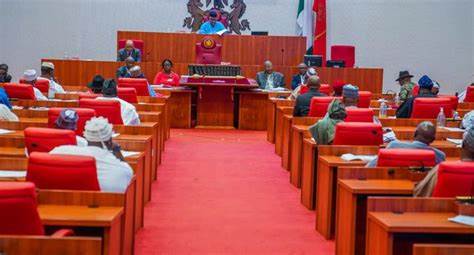- Safiu Kehinde
The Nigerian Senate has approved two out of the four Tax Reform Bills.
Lawmakers consented the bills after considering and adopting recommendations from the Senate Committee on Finance, led by Sen. Sani Musa, during the red chamber’s plenary on Wednesday.
Recall that the four tax bills which include the Joint Revenue Board (Establishment) Bill, 2025; the Nigeria Revenue Service (Establishment) Bill, 2025; the Nigeria Tax Administration Bill; and the Nigeria Tax Bill have been subject of controversy since its inception.
Members of the public and stakeholders across the country had raised concern over the bills, especially the Northern region where some leaders claimed the region will be shortchanged by the bills.
In effort to clarify the provisions of the bills, several public hearings were held for the analysis of the provisions.
Meanwhile, the Senate on Wednesday approved the Bill to Repeal the Federal Inland Revenue Service Act and enact the Nigeria Revenue Service (Establishment) Bill, 2025.
The second approved bill is the Nigeria Tax Administration Bill which covers the assessment, collection, and accounting for revenue accruing to the federation, federal, states, and local governments.
It also prescribes the powers and functions of tax authorities and other related matters.
Sani, presenting the report, said the bills aimed to reform Nigeria’s tax framework, strengthen institutions, and improve accountability and compliance.
Deputy Senate President, Jibrin Barau, congratulated the Senate, the Finance Committee, and the Elders Committee for their leadership and wisdom in passing the bills.
He noted that there were initially disagreements and rancour. However, the Senate stood firm, establishing the Elders Committee to address contentious areas and consult various stakeholders.
Senate President, Godswill Akpabio, announced that the remaining two bills would be considered in plenary on Thursday.
He commended the Finance Committee and senators for their thorough work. Akpabio also thanked the “elder senators” who addressed areas of contention through meetings and consultations.
Akpabio expressed optimism that the tax laws would revolutionise and optimise tax collection nationwide.
He also assured that the bills would benefit all Nigerians, dispelling rumours they were designed to favour a specific region.


